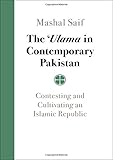The 'Ulama in contemporary Pakistan : contesting and cultivating an Islamic Republic
نوع المادة : نصتفاصيل النشر:Cambridge : Cambridge University Press, 2020تدمك:
نصتفاصيل النشر:Cambridge : Cambridge University Press, 2020تدمك:- 9781108839730
- 32
| نوع المادة | المكتبة الحالية | رقم الطلب | رقم النسخة | حالة | تاريخ الإستحقاق | الباركود | |
|---|---|---|---|---|---|---|---|
|
|
Bibliothèque centrale | XX(787575.1) (إستعراض الرف(يفتح أدناه)) | 1 | المتاح | 000007967283 |
In this book, Mashal Saif explores how contemporary 'ulama, the guardians of religious knowledge and law, engage with the world's most populated Islamic nation-state: Pakistan. In mapping these engagements, she weds rigorous textual analysis with fieldwork and offers insight into some of the most significant and politically charged issues in recent Pakistani history. These include debates over the rights of women; the country's notorious blasphemy laws; the legitimacy of religiously mandated insurrection against the state; sectarian violence; and the place of Shi'as within the Sunni majority nation. These diverse case studies are knit together by the project's most significant contribution: a theoretical framework that understands the 'ulama's complex engagements with their state as a process of both contestation and cultivation of the Islamic Republic by citizen-subjects. This framework provides a new way of assessing state - 'ulama relations not only in contemporary Pakistan but also across the Muslim world.
لا توجد تعليقات على هذا العنوان.


